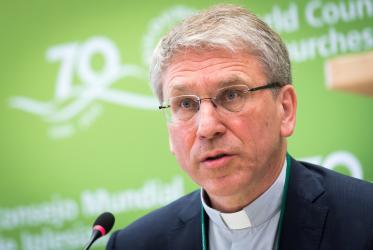Displaying 1 - 19 of 19
COVID-19 in conflict zones: “a crisis within another crisis”
27 November 2020
WCC organises event on “The Human Rights Situation in the Philippines”
18 September 2019
WCC condemns massacre of farmers in Philippines
12 April 2019
A moment in ‘Time’: an interreligious vision in Erlangen
20 December 2018
All pilgrim routes lead to COP24
11 December 2018
“Love will find a way”
23 August 2018
#WCC70: A prayer about health and healing
20 July 2018
In Lebanon, refugees face hardship - but find hope
16 March 2017
Climate pilgrimage toward COP21 pauses in Geneva
05 November 2015
Local and global work saves lives
22 October 2015









